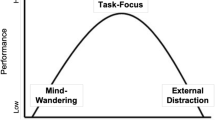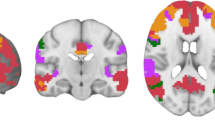Abstract
Anxiety has been associated with poor attentional control, as reflected in lowered performance on experimental measures of executive attention and inhibitory control. Recent conceptualisations of anxiety propose that individuals who report elevated anxiety symptoms worry about performance and will exert greater cognitive effort to complete tasks well, particularly when cognitive demands are high. Across two experiments, we examined the effect of anxiety on task performance and across two load conditions using (1) measures of inhibitory control (behavioural reaction times and eye-movement responses) and (2) task effort with pupillary and electrocortical markers of effort (CNV) and inhibitory control (N2). Experiment 1 used an oculomotor-delayed-response task that manipulated load by increasing delay duration to create a high load, relative to a low load, condition. Experiment 2 used a Go/No-Go task and load was manipulated by decreasing the No-Go probabilities (i.e., 20% No-Go in the high load condition and 50% No-Go in the low load condition). Experiment 1 showed individuals with high (vs. low) anxiety made more antisaccade errors across load conditions, and made more effort during the high load condition, as evidenced by greater frontal CNV and increased pupillary responses. In Experiment 2, individuals with high anxiety showed increased effort (irrespective of cognitive load), as characterised by larger pupillary responses. In addition, N2 amplitudes were sensitive to load only in individuals with low anxiety. Evidence of reduced performance effectiveness and efficiency across electrophysiological, pupillary, and oculomotor systems in anxiety provides some support for neurocognitive models of frontocortical attentional dysfunction in anxiety.








Similar content being viewed by others
References
Ainsworth B, Garner M (2013) Attention control in mood and anxiety disorders: evidence from the antisaccade task. Hum Psychopharmacol 28(3):274–280. https://doi.org/10.1002/hup.2320
Ansari TL, Derakshan N (2010) Anxiety impairs inhibitory control but not volitional action control. Cogn Emot 24(2):241–254. https://doi.org/10.1080/02699930903381531
Ansari TL, Derakshan N (2011a) The neural correlates of cognitive effort in anxiety: effects on processing efficiency. Biol Psychol 86(3):337–348. https://doi.org/10.1016/j.biopsycho.2010.12.013
Ansari TL, Derakshan N (2011b) The neural correlates of impaired inhibitory control in anxiety. Neuropsychologia 49(5):1146–1153. https://doi.org/10.1016/j.neuropsychologia.2011.01.019
Ansari TL, Derakshan N, Richards A (2008) Effects of anxiety on task switching: evidence from the mixed antisaccade task. Cogn Affect Behav Neurosci 8(3):229–238. https://doi.org/10.3758/cabn.8.3.229
Bar-Haim Y, Lamy D, Pergamin L, Bakermans-Kranenburg MJ, van IMH (2007) Threat-related attentional bias in anxious and nonanxious individuals: a meta-analytic study. Psychol Bull 133(1):1–24. https://doi.org/10.1037/0033-2909.133.1.1
Beatty J (1982) Task-evoked pupillary responses, processing load, and the structure of processing resources. Psychol Bull 91(2):276–292. https://doi.org/10.1037//0033-2909.91.2.276
Beatty J, Lucero-Wagoner B (2000) The pupillary system. In: Cacioppo JT, Tassinary LG, Bernston GG (eds) Handbook of psychophysiology. Cambridge University Press, New York, pp 142–162
Berggren N, Derakshan N (2013) Attentional control deficits in trait anxiety: why you see them and why you don’t. Biol Psychol 92(3):440–446. https://doi.org/10.1016/j.biopsycho.2012.03.007
Berggren N, Richards A, Taylor J, Derakshan N (2013) Affective attention under cognitive load: reduced emotional biases but emergent anxiety-related costs to inhibitory control. Front Hum Neurosci 7:188. https://doi.org/10.3389/fnhum.2013.00188
Bishop SJ (2009) Trait anxiety and impoverished prefrontal control of attention. Nat Neurosci 12(1):92–98. https://doi.org/10.1038/nn.2242
Bradley MM, Miccoli L, Escrig MA, Lang PJ (2008) The pupil as a measure of emotional arousal and autonomic activation. Psychophysiology 45(4):602–607. https://doi.org/10.1111/j.1469-8986.2008.00654.x
Browning M, Behrens TE, Jocham G, O’Reilly JX, Bishop SJ (2015) Anxious individuals have difficulty learning the causal statistics of aversive environments. Nat Neurosci 18(4):590–596. https://doi.org/10.1038/nn.3961
Bruin KJ, Wijers AA (2002) Inhibition, response mode, and stimulus probability: a comparative event-related potential study. Clin Neurophysiol 113(7):1172–1182. https://doi.org/10.1016/S1388-2457(02)00141-4
Curtis CE, D’Esposito M (2003) Persistent activity in the prefrontal cortex during working memory. Trends Cogn Sci 7(9):415–423. https://doi.org/10.1016/s1364-6613(03)00197-9
Donders FC (1969) On the speed of mental processes. Acta Psychol (Amst) 30:412–431. https://doi.org/10.1016/0001-6918(69)90065-1
Eimer M (1993) Effects of attention and stimulus probability on ERPs in a Go/Nogo task. Biol Psychol 35(2):123–138. https://doi.org/10.1016/0301-0511(93)90009-W
Eysenck MW, Derakshan N (2011) New perspectives in attentional control theory. Personal Individ Differ 50(7):955–960. https://doi.org/10.1016/j.paid.2010.08.019
Eysenck MW, Derakshan N, Santos R, Calvo MG (2007) Anxiety and cognitive performance: attentional control theory. Emotion 7(2):336–353. https://doi.org/10.1037/1528-3542.7.2.336
Falkenstein M, Hoormann J, Hohnsbein J (1999) ERP components in Go Nogo tasks and their relation to inhibition. Acta Physiol (Oxf) 101(2–3):267–291. https://doi.org/10.1016/S0001-6918(99)00008-6
Ford KA, Goltz HC, Brown MR, Everling S (2005) Neural processes associated with antisaccade task performance investigated with event-related FMRI. J Neurophysiol 94(1):429–440. https://doi.org/10.1152/jn.00471.2004
Garner M, Attwood A, Baldwin DS, James A, Munafo MR (2011) Inhalation of 7.5% carbon dioxide increases threat processing in humans. Neuropsychopharmacology 36(8):1557–1562. https://doi.org/10.1038/npp.2011.15
Geva R, Zivan M, Warsha A, Olchik D (2013) Alerting, orienting or executive attention networks: differential patters of pupil dilations. Front Behav Neurosci 7:145. https://doi.org/10.3389/fnbeh.2013.00145
Granholm E, Morris S, Asarnow RF, Chock D, Jeste DV (2000) Accelerated age-related decline in processing resources in schizophrenia: evidence from pupillary responses recorded during the span of apprehension task. J Int Neuropsychol Soc 6(1):30–43. https://doi.org/10.1017/s1355617700611049
Hepsomali P, Hadwin JA, Liversedge SP, Garner M (2017) Pupillometric and saccadic measures of affective and executive processing in anxiety. Biol Psychol 127:173–179. https://doi.org/10.1016/j.biopsycho.2017.05.013
Herrmann MJ, Jacob C, Unterecker S, Fallgatter AJ (2003) Reduced response-inhibition in obsessive–compulsive disorder measured with topographic evoked potential mapping. Psychiatry Res 120(3):265–271. https://doi.org/10.1016/s0165-1781(03)00188-4
Kahneman D, Beatty J (1966) Pupil diameter and load on memory. Science 154(3756):1583–1585. https://doi.org/10.1126/science.154.3756.1583
Karatekin C, Marcus DJ, Couperus JW (2007) Regulation of cognitive resources during sustained attention and working memory in 10-year-olds and adults. Psychophysiology 44(1):128–144. https://doi.org/10.1111/j.1469-8986.2006.00477.x
Khader P, Schicke T, Roder B, Rosler F (2008) On the relationship between slow cortical potentials and BOLD signal changes in humans. Int J Psychophysiol 67(3):252–261. https://doi.org/10.1016/j.ijpsycho.2007.05.018
Kim MS, Kim YY, Yoo SY, Kwon JS (2007) Electrophysiological correlates of behavioral response inhibition in patients with obsessive-compulsive disorder. Depress Anxiety 24(1):22–31. https://doi.org/10.1002/da.20195
Lavric A, Pizzagalli DA, Forstmeier S (2004) When ‘go’ and ‘nogo’ are equally frequent: ERP components and cortical tomography. Eur J Neurosci 20(9):2483–2488. https://doi.org/10.1111/j.1460-9568.2004.03683.x
Low KA, Miller J (1999) The usefulness of partial information: effects of go probability in the choice/Nogo task. Psychophysiology 36(3):288–297. https://doi.org/10.1017/s0048577299980332
Luna B, Velanova K (2011) Development from reflexive to controlled eye movements. In: Liversedge SP, Gilchrist ID, Everling S (eds) The Oxford handbook of eye movements. Oxford University Press, NY, pp 621–642
Mandrick K, Peysakhovich V, Rémy F, Lepron E, Causse M (2016) Neural and psychophysiological correlates of human performance under stress and high mental workload. Biol Psychol 121:62–73
Najmi S, Amir N, Frosio KE, Ayers C (2015) The effects of cognitive load on attention control in subclinical anxiety and generalised anxiety disorder. Cogn Emot 29(7):1210–1223. https://doi.org/10.1080/02699931.2014.975188
Oldfield RC (1971) The assessment and analysis of handedness: The Edinburgh inventory. Neuropsychologia 9(1):97–113. https://doi.org/10.1016/0028-3932(71)90067-4
Pacheco-Unguetti AP, Acosta A, Callejas A, Lupianez J (2010) Attention and anxiety: different attentional functioning under state and trait anxiety. Psychol Sci 21(2):298–304. https://doi.org/10.1177/0956797609359624
Partala T, Surakka V (2003) Pupil size variation as an indication of affective processing. Int J Hum Comput Stud 59(1–2):185–198. https://doi.org/10.1016/S1071-5819(03)00017-X
Pfefferbaum A, Ford JM (1988) ERPs to stimuli requiring response production and inhibition: effects of age, probability and visual noise. Electroencephalogr Clin Neurophysiol 71(1):55–63. https://doi.org/10.1016/0168-5597(88)90019-6
Polich J, Ellerson PC, Cohen J (1996) P300, stimulus intensity, modality, and probability. Int J Psychophysiol 23:55–62. https://doi.org/10.1016/0167-8760(96)00028-1
Rämä P, Carlson S, Kekomi J, Hämäläinen H (1995) A spatial oculomotor memory-task performance priduces a task-related slow shift in human electroencaphalography. Electroencephalogr Clin Neurophysiol 94:371–380
Righi S, Mecacci L, Viggiano MP (2009) Anxiety, cognitive self-evaluation and performance: ERP correlates. J Anxiety Disord 23(8):1132–1138. https://doi.org/10.1016/j.janxdis.2009.07.018
Roche RA, Garavan H, Foxe JJ, O’Mara SM (2005) Individual differences discriminate event-related potentials but not performance during response inhibition. Exp Brain Res 160(1):60–70. https://doi.org/10.1007/s00221-004-1985-z
Sehlmeyer C, Konrad C, Zwitserlood P, Arolt V, Falkenstein M, Beste C (2010) ERP indices for response inhibition are related to anxiety-related personality traits. Neuropsychologia 48(9):2488–2495. https://doi.org/10.1016/j.neuropsychologia.2010.04.022
Simmonds DJ, Pekar JJ, Mostofsky SH (2008) Meta-analysis of Go/No-go tasks demonstrating that fMRI activation associated with response inhibition is task-dependent. Neuropsychologia 46(1):224–232. https://doi.org/10.1016/j.neuropsychologia.2007.07.015
Spielberger CD, Gorusch RL, Lushene R, Vagg PR, Jacobs GA (1983) Manual for state-trait anxiety inventory. Consulting Psychologists Press, Palo Alto
Studer P, Kratz O, Gevensleben H, Rothenberger A, Moll GH, Hautzinger M, Heinrich H (2014) Slow cortical potential and theta/beta neurofeedback training in adults: effects on attentional processes and motor system excitability. Front Hum Neurosci 8:555. https://doi.org/10.3389/fnhum.2014.00555
Turner LM, Croft RJ, Churchyard A, Looi JC, Apthorp D, Georgiou-Karistianis N (2015) Abnormal electrophysiological motor responses in huntington’s disease: evidence of premanifest compensation. PLoS One 10(9):e0138563. https://doi.org/10.1371/journal.pone.0138563
Vytal KE, Cornwell BR, Letkiewicz AM, Arkin NE, Grillon C (2013) The complex interaction between anxiety and cognition: insight from spatial and verbal working memory. Front Hum Neurosci 7(93):1–11. https://doi.org/10.3389/Fnhum.2013.00093
Walter WG, Cooper R, Aldridge VJ, McCallum WC, Winter AL (1964) Contingent negative variation: an electric sign of sensori-motor association and expectancy in the human brain. Nature 203(4943):380–384. https://doi.org/10.1038/203380a0
Wilson E, MacLeod C (2003) Contrasting two accounts of anxiety-linked attentional bias: selective attention to varying levels of stimulus threat intensity. J Abnorm Psychol 112(2):212–218. https://doi.org/10.1037/0021-843x.112.2.212
Yang L, Li XB (2014) Anxiety alters brain activity of response inhibition: evidence from event-related potentials and source current density analysis. In: 2014 4th IEEE international conference on information science and technology (Icist), 160–163. https://doi.org/10.1109/icist.2014.6920355
Funding
This research was supported by funds from the Economic and Social Research Council Doctoral Training Centre studentship (Award no:1362797) awarded to Piril Hepsomali, and the School of Psychology, University of Southampton.
Author information
Authors and Affiliations
Corresponding authors
Additional information
Publisher’s Note
Springer Nature remains neutral with regard to jurisdictional claims in published maps and institutional affiliations.
Rights and permissions
About this article
Cite this article
Hepsomali, P., Hadwin, J.A., Liversedge, S.P. et al. The impact of cognitive load on processing efficiency and performance effectiveness in anxiety: evidence from event-related potentials and pupillary responses. Exp Brain Res 237, 897–909 (2019). https://doi.org/10.1007/s00221-018-05466-y
Received:
Accepted:
Published:
Issue Date:
DOI: https://doi.org/10.1007/s00221-018-05466-y




